EDIT: Query is called from vba, used to create array, passed to create form:
QueryFieldAsSeparatedString("Batch", "TLR", "Batch")
strBndls = Replace(strBndls, ",", ";")
subNewControls strBndls, "frmSelectBundle"
The reason I thought this quicksort would work is because batch #13 gets lumped in with the 1's using the sortby clause.
Example table:
- Order # | Batch
- 1 | 1
- 1 | 13
- 1 | 1b
- 1 | 2
- 1 | 2a
- 1 | 1a
- 1 | 3
- 1 | 6
- 1 | 7
- 1 | 9
- 1 | 11
- 1 | 6a
- 1 | 7b
- 1 | 8
- 1 | 13a
- 1 | 7a
desired string returned: 1, 1a, 1b, 2, 2a, 3, 6, 6a, 7, 7a, 7b, 8, 9, 11, 13, 13a
Current Output Side Note: there are duplicates in this table that have different information separating them (shipment_box# and product_size). I'm hoping to group them since the operator would be entering data against the whole batch on the same order and child batch (batches with a letter), regardless of other data
Original Post:
I am attempting to sort a column in an access table. I found this code from VBA array sort function? and am attempting to make it work. I would have commented on the post but am unable to comment since I am new to the forum.
Specifically I am looking at this bit of code:
Public Sub QuickSort(ByRef Field() As String, ByVal LB As Long, ByVal UB As Long)
Dim P1 As Long, P2 As Long, Ref As String, TEMP As String
P1 = LB
P2 = UB
Ref = Field((P1 + P2) / 2)
Do
Do While (Field(P1) < Ref)
P1 = P1 + 1
Loop
Do While (Field(P2) > Ref)
P2 = P2 - 1
Loop
If P1 <= P2 Then
TEMP = Field(P1)
Field(P1) = Field(P2)
Field(P2) = TEMP
P1 = P1 + 1
P2 = P2 - 1
End If
Loop Until (P1 > P2)
If LB < P2 Then Call QuickSort(Field, LB, P2)
If P1 < UB Then Call QuickSort(Field, P1, UB)
End Sub
I use this block of code to create a delimited string of all records in a 'Product Batch' field.
Public Function QueryFieldAsSeparatedString(ByVal fieldName As String, _
ByVal tableOrQueryName As String, _
Optional ByVal criteria As String = "", _
Optional ByVal sortBy As String = "", _
Optional ByVal delimiter As String = ", " _
) As String
' Paramter description
' fieldName = Is the name of the field containing the values
' we want in our comma separated string
' tableOrQueryName = Is the name of table or query containing the column
' criteria = The criteria to filter the data
' sortBy = An optional sort expression to sort the data
' delimiter = The delimiter used to separate the values. It defaults
' to a comma and a blank, but you can use anything you
' like there
Dim db As DAO.Database
Dim rs As DAO.Recordset
Dim sql As String
Dim whereCondition As String
Dim sortExpression As String
Dim retVal As String
Set db = CurrentDb
' If there where any criteria passed to the function, we build a WHERE-condition for SQL
If Len(criteria) > 0 Then
whereCondition = " WHERE " & criteria
End If
' If there was a sort expression passed to the function, we build a ORDER BY for SQL
If Len(sortBy) > 0 Then
sortExpression = " ORDER BY " & sortBy
End If
' building the complete SQL string
sql = "SELECT " & fieldName & " FROM " & tableOrQueryName & whereCondition & sortExpression &
";"
' opening a recordset
Set rs = db.OpenRecordset(sql, dbOpenForwardOnly, dbReadOnly)
Do Until rs.EOF
' here we are looping through the records and, if the value is not NULL,
' concatenate the field value of each record with the delimiter
If Not IsNull(rs.Fields(0).Value) Then
retVal = retVal & Nz(rs.Fields(0).Value, "") & delimiter
End If
rs.MoveNext
Loop
' we cut away the last delimiter
retVal = Left(retVal, Len(retVal) - Len(delimiter))
' setting the return value of the function
QueryFieldAsSeparatedString = retVal
' cleaning up our objects
rs.Close
Set rs = Nothing
Set db = Nothing
End Function
This list is put into an array and used to dynamically create a batch number selection form, where each item in the list becomes a checkbox with the batch as a label. So an operator can choose which batch(es) have been worked on that day.
What my challenge/question is how would I go about sorting the batch string? The format is: 1, 1a, 2, 2a, 2b, ...
but comes in, in the order it is in the table. So it looks like 2a, 1, 2b, 1a, 1b, 2, ...
I'm going between the quicksort and figuring out a way to order/group the table before the string is even created, which may be in the second block of code; just not used properly.
The end goal would be to create another array consisting of the selected batches to continue data entry.
Any thoughts or questions are greatly appreciated!

